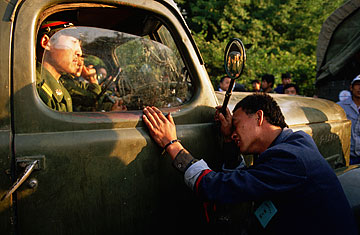
A weary protester pleads with a PLA officer to halt the crackdown
(3 of 3)
And the next night the soldiers returned, this time in tanks or armed with machine guns. Eyewitnesses reported indiscriminate shooting into the crowds. If China's leaders faced, as they later claimed, a violent rebellion, it was because they had created one. By the early hours of June 4, hundreds of citizens were dead. Wang Dan, the young man who had led those democracy salons, topped the most-wanted list of fugitives after the massacre and was arrested within a month. (Years later, he was allowed to leave for the U.S.) Fang Lizhi took refuge in the U.S. embassy, where he would remain for a year before China let him emigrate.
Immediately after the violence, I returned to Beijing. My wife and son joined me a few weeks later. It was a grim scene. The sense of hope had been crushed. Few would even dare talk to a Western journalist. Most of our Chinese friends laid low; it was months in some cases before we even knew whether they had survived the massacre. Official goons in cars and on motorcycles followed us whenever we went out. Knowing our phones were tapped, we made up false rendezvous, hoping security agents would take the bait and waste their time staking out our false leads.
The country fell into a deep darkness that would start to turn only in 1992, after we had left Beijing, when Deng Xiaoping realized the country had veered off in the wrong direction. He took a celebrated trip to the freewheeling south and called for a reinvigoration of China's capitalist-style reforms, restarting many of the initiatives that his onetime protégé, Zhao, had championed. The Chinese economic juggernaut was under way. But political freedom has yet to flower.
Power Book
As for Ahao, he would spend the last 16 years of his life under house arrest, out of the public eye. He died in 2005. It had been assumed, and lamented, that he never left a memoir about the events of 1989. Was he too bitter? Too feeble? Too tightly controlled? In fact, under the nose of his captors, he was secretly recording his take on what really happened during Tiananmen.
More than a year ago, I was brought in on that secret by Bao Pu, the political activist whose father, Bao Tong, had been Zhao's closest aide. The younger Bao had been tasked with assembling and translating, in Hong Kong, the 30 hours of tapes Zhao had secretly recorded. Bao Pu brought me in as a co-editor, and this May Simon & Schuster released Prisoner of the State: The Secret Journal of Premier Zhao Ziyang. The book can't be sold in mainland China. But unauthorized versions of the Chinese-language edition are being downloaded across the country. Zhao's memoir will reveal to many Chinese the extent of the disagreement at the highest levels on how to respond to the Tiananmen protests. They will learn that some top officials advocated a softer approach and a tolerance for dissent that they argued didn't threaten the Party or the nation. The killings, in other words, didn't have to happen.
Yet the victims of Tiananmen did not die in vain. The crackdown produced deep anguish around the world. Later in that tumultuous year, when the winds of protest arrived in East Germany, leaders there faced a similar choice. In the end they avoided bloodshed. They opened checkpoints at the Berlin Wall, and the East bloc was on its way toward gaining its freedom.
Someday, the Chinese will have their day, too.
Ignatius is editor in chief of the Harvard Business Review